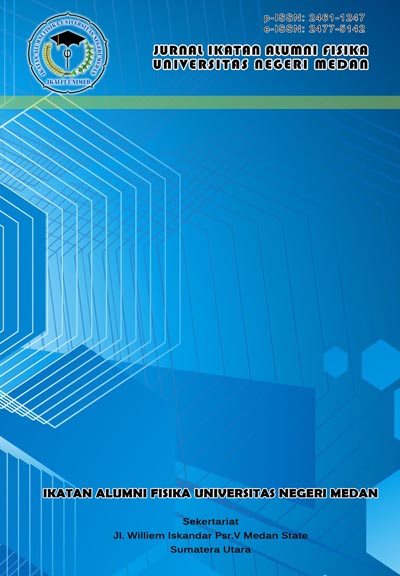THE EFFECT OF INQUIRY LEARNING MODEL ON STUDENTS™ LEARNING OUTCOMES ON TOPIC MEASUREMENT
DOI:
https://doi.org/10.24114/jiaf.v5i2.12545Keywords:
Inquiry Learning Model, Gender, Students’ Learning OutcomesAbstract
This study aims to find out whether: 1) there is the effect of inquiry and conventional learning models on student learning outcomes, 2) there is gender effect on student learning outcomes, 3) there is an interaction between learning models and gender in student learning outcomes. The type of this research is Quasi Experiment Research which was conducted in SMA Negeri 9 Medan.The sampling technique used is random sampling. The experimental class selected X IPA 3 and the control class selected X IPA 4, which each class consists of 30 students. The instrument used to measure student learning outcomes is posttest in multiple choice forms as many as 20 questions. The data analysis technique is two-way ANOVA. From the analysis of the experimental class and the control class, were obtained the average score of posttest in experimental class is 79,17 and the average score of posttest in control class is 71,83. Then the result of research which obtained: 1) Fcalculate > Ftable i.e. 15,62 > 4,01 so that H0 rejected and H1 accepted which means that there is any effect of inquiry and conventional learning model on students™ learning outcomes, 2) Fcalculate > Ftable i.e. 8,57 > 4,01 so that H0 rejected and H1 accepted which means that there is any effect of gender on students™ learning outcomes, 3) Fcalculate > Ftable i.e. 11,69 > 4,01 so that H0 rejected and H1 accepted which means that there is any interaction between learning model and gender on students™ learning outcomes. So it can be concluded that the inquiry learning model has a better effect than conventional learning model on students™ learning outcomes on topic measurement in grade X SMA Negeri 9 Medan.References
Hartel, W. R., Foegeding, A. E., Learning: Objectives, Competencies, or Outcomes?, Journal of Food Science Education, 3(4):69-70.
Sanjaya, W., (2017), Pembelajaran dalam Implementasi Kurikulum Berbasis Kompetensi, Jakarta: Prenada Media Group.
Sirait, M., Siaen, E., (2016), Pengaruh Model Pembelajaran Inkuiri terhadap Hasil Belajar Siswa pada Materi Pokok Suhu dan Kalor di Kelas X Semester II SMA NEGERI 1 SILIMA PUNGGAPUNGGA, Jurnal Ikatan Alumni Fisika Universitas Negeri Medan, 2(2):5-9.
Smallhorn, M., Young, J., Hunter, N., and Burke, K., (2015), Inquiry-based learning to improve student engagement in a large first year topic, Student Success, 6(2):65-71.
Sudjana, N., (2009), Metoda Statistika, Bandung: Tarsito.
Sugiyono, (2016), Metode Penelitian Kuantitatif, Kualitatif dan R&B, Bandung: Alfabeta.
Supardi, (2016), Aplikasi Statitistika dalam Penelitian Konsep Statitistika yang Lebih Komprehensif, Yogyakarta: Pustaka Pelajar.
Taurina, Z., (2015), Students™ Motivation and Learning Outcomes: Significant Factors in Internal Study Quality Assurance System, International Journal for Cross-Disciplinary Subjects in Education (IJCDSE), 5(4):2625-2630.
Wahyudi, Astriani, and Nurhayati, (2014), Penerapan Model Direct Instruction terhadap Hasil Belajar Fisika Materi Pengukuran ditinjau dari Gender pada Siswa, Jurnal Inovasi dan Pembelajaran Fisika, 1(2):178-186.
Yuliana, T., Handhika, J., Huriawati, F., (2017), Penerapan Metode Inkuiri Terbimbing Berbantukan Modul pada Materi Alat Optik Terhadap Peningkatan Hasil Belajar Siswa SMP dalam Ranah Kognitif, Prosiding SNFA (Seminar Nasional Fisika dan Aplikasinya), 1(2):325-329.
Downloads
Published
Issue
Section
License
Copyright (c) 2019 JURNAL IKATAN ALUMNI FISIKA UNIVERSITAS NEGERI MEDAN

This work is licensed under a Creative Commons Attribution 4.0 International License.
Authors who publish with this journal agree to the following terms:- Authors retain copyright and grant the journal right of first publication with the work simultaneously licensed under a Creative Commons Attribution License that allows others to share the work with an acknowledgement of the work's authorship and initial publication in this journal.
- Authors are able to enter into separate, additional contractual arrangements for the non-exclusive distribution of the journal's published version of the work (e.g., post it to an institutional repository or publish it in a book), with an acknowledgement of its initial publication in this journal.
- Authors are permitted and encouraged to post their work online (e.g., in institutional repositories or on their website) prior to and during the submission process, as it can lead to productive exchanges, as well as earlier and greater citation of published work (See The Effect of Open Access).


 Jl. Williem Iskandar Psr. V, Medan Estate, Kec. Percut Sei Tuan, Kabupaten Deli Serdang, Sumatera Utara 20221
Jl. Williem Iskandar Psr. V, Medan Estate, Kec. Percut Sei Tuan, Kabupaten Deli Serdang, Sumatera Utara 20221